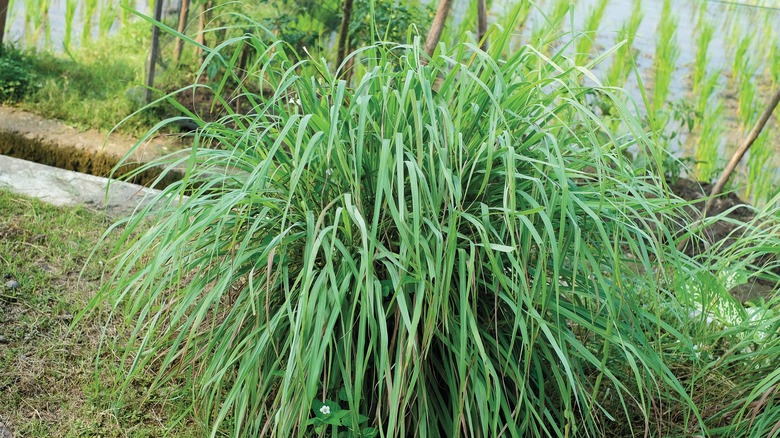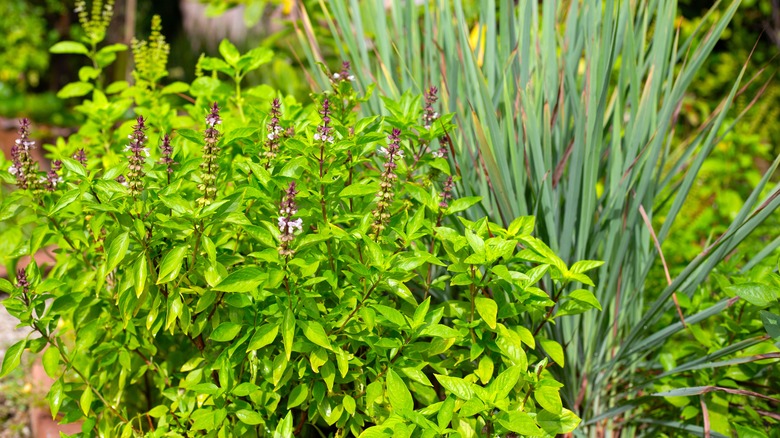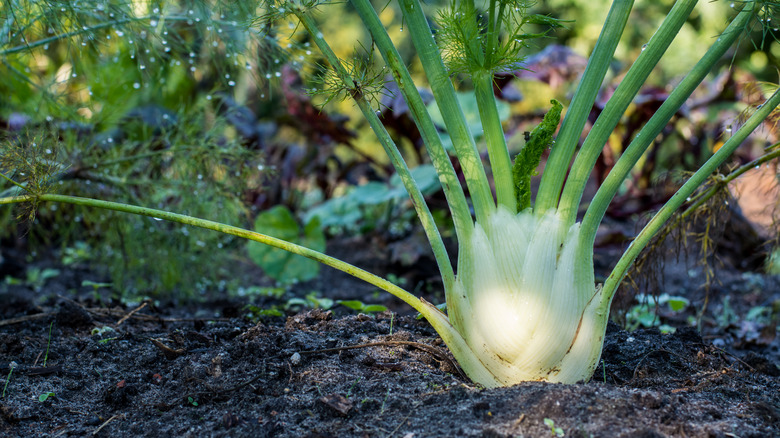Plants That Grow Well Next To Lemongrass In The Garden (& Ones To Avoid)
Lemongrass (Cymbopogon flexuosus) is a great yet unexpected addition to your herb garden, particularly for its culinary uses as a zesty accoutrement to dishes and for its plethora of medicinal purposes. Native to Southeast Asia, lemongrass is a staple as a digestive remedy and an anti-inflammatory. Lemongrass also holds a number of benefits aside from its zhuzh factor in the kitchen and internal medicine qualities. In fact, it's particularly powerful against a number of pests that are repelled by lemongrass due to the citronella oil housed in its bushy blades, so growing the herb may help keep mice out of your garden and ward off pesky insects. Despite being an ornamental grass, you can get many uses out of this versatile herb.
While growing this fragrant herb is relatively easy, some gardeners may encounter some common problems while growing lemongrass, like pests that actually love to munch on the aromatic herb (aphids, spider mites, and whiteflies specifically) or disease issues (like leaf blight). It may sound like a labor of love to constantly maintain lemongrass in the garden, but the solution could be as simple as choosing the right companion plants that help the herb grow and thrive. Lemongrass' best friends are commonly other herbs, like cilantro or basil, or nitrogen-fixing veggies like beans. While you'll find that there are optimal lemongrass companions in the garden, there are, at the same time, several plants to avoid planting near your zesty herb too – the outcome can mean poor plant quality or even the demise of the plant itself!
Great companion plants to lemongrass
Though lemongrass can repel a number of pests, it can also attract some that have acquired a taste for that particular flavor. Much like how lemongrass may ward off unwanted diners for other plants in your garden, there are some companion plants that shoo pests away from the lemongrass itself. This includes a fellow herb, cilantro. Though cilantro itself doesn't necessarily scare off the nibbling fiends, the pest-predators that it attracts does feed on (and scare away) the lemongrass eaters. Basil, meanwhile, repels pests because of its strong scent.
If you're looking to plant some companion veggies around the lemongrass, there are a couple of beneficial standouts among the classic line up. Lemongrass does particularly well with nitrogen-fixing species, like various beans. Some gardeners believe that lemongrass will also be at its best when planted with other vegetation that comes from a similar region as the herb, including ginger and turmeric. While not necessarily beneficial, crops like tomatoes and peppers will make good neighbors because they thrive in similar growing conditions. As for the aesthetic gardeners that want to add some colorful touches, lemongrass does well with certain flowers too. Marigolds, for example, repel aphids and nematodes while smothering weeds that threaten lemongrass' longevity. Some gardeners also prefer to pair lemongrass with certain fruit trees and bushes like citrus trees, strawberries, and blueberries.
Plants to avoid with lemongrass
To ensure that your lemongrass will thrive and you'll have plentiful stock to use in the kitchen or in your medicine cabinet, make sure you avoid certain plants that will inhibit lemongrass' growth. As a rule of thumb, you do not want to plant anything that competes for resources, namely water and space. Fennel, for instance, can crowd out and outcompete lemongrass with its dense root system, not to mention it emits allelopathic chemicals that inhibit the growth of neighboring plants.
Rosemary and sage are also poor companion plants for lemongrass, mostly because they all require different environmental conditions that are at odds with how lemongrass prefers to grow. These herbs prefer dry soil environments, while lemongrass thrives in moisture-rich soils. Rosemary, in particular, may try to outcompete lemongrass for space, nutrients, and other resources while sage particularly thrives in dry climates.
If you're relatively diligent about which plants you grow around lemongrass, its relaxing nature and no-fuss growing process will reward you with a wonderful, aromatic resource that can be used equally in the kitchen as well as in home remedies and cures. At the end of the day, you may just have a lovely bunch of lemongrass for that Thai curry or soothing tea!


